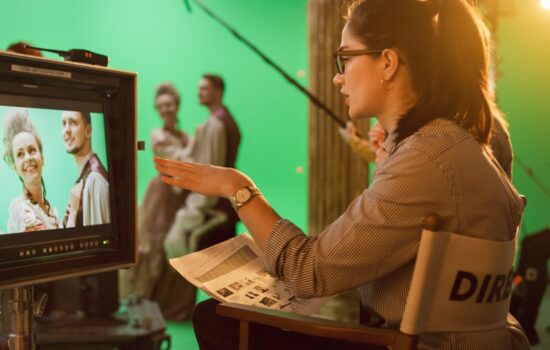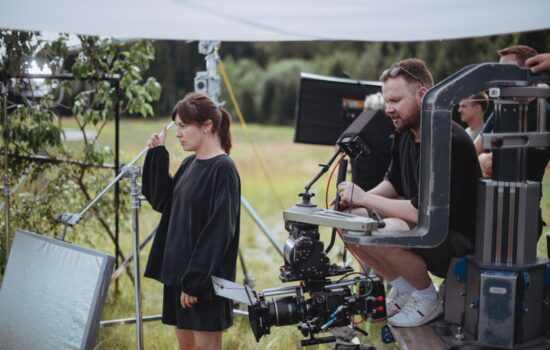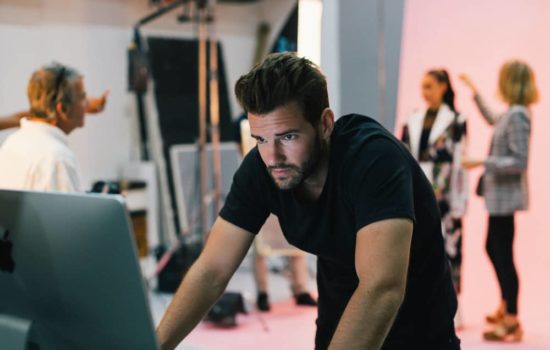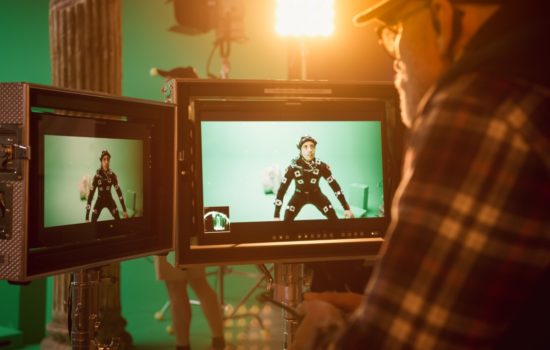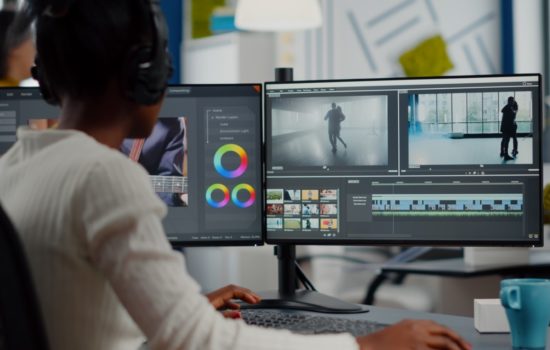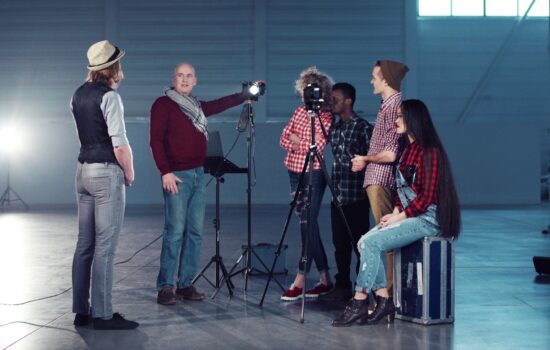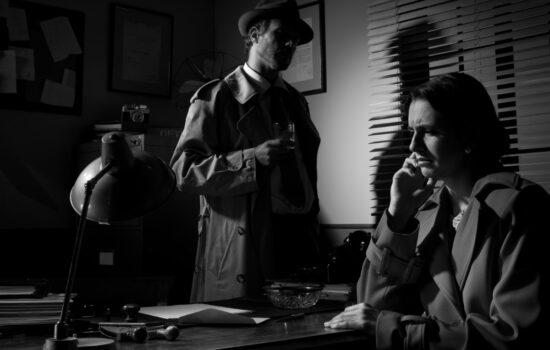Assistant Editor

How To Become an Assistant Editor
People also ask
Career Description
The Assistant Editor is a technical and creative job that supports the main Editor of a project by setting up the media and handling all exports with the proper codecs. They are often aspiring Editors who will be learning from the Picture Editor. Sometimes the Assistant Editor will cut small parts of a project.
Daniel Riser, who has worked as an Assistant Editor on multiple trailers, music videos, and features says, “Basically, the goal is to get it ready for the Editor. It is labeling every clip so it matches with the slate on set, compiling the footage, setting up a project file, and creating an assembly edit. There is lots of administrative and grunt work involved to get a project set so all the Editor has to do is sit down and cut.”
The Assistant Editor works in the post-production phase of filmmaking. Under the supervision of the Editor, they will begin work making proxy files for footage, setting up a project to the Editor’s desired specs and prepping each individual shot. They are also responsible for doing exports so that off-site managers like a Director or the Producers can review footage and give notes.
What does an Assistant Editor do in film?
An Assistant Editor is an indispensable colleague to a Film Editor. While the Film Editor concentrates on the actual cutting of a movie, the Assistant Editor is the person who makes sure all other needs are being addressed in the editing room. That means communicating with other departments and checking the rushes to ensure they are free of any technical problems.
Salary
The average annual salary for Assistant Editors is approximately $57,500. The salary range for Assistant Editors runs from $39,000 to $87,000.
An Assistant Editor’s earnings will vary based on several factors. If they work at a post house, they’ll receive a set salary with benefits. If they’re freelance, they’ll have to set their own day or hourly rates. Union Assistant Editors will be paid according to the scale established by IATSE.
Hey, what do you think about trying our new Film Career HelperFilm Career Helper really quick? It’s totally free and could help get your career moving fast! Give it a try. It’s totally free and you have nothing to lose.
Career Outlook
“Deadlines control an Assistant Editor’s lifestyle and schedule,” says Riser. The job is a freelance position. Working hours are dependent on the duration of a job, when it’s due, and any other work the Assistant Editor takes on.
Usually, when it rains, it pours and an Assistant Editor will take on multiple jobs at once, working days, evenings and weekends. However, if they are contracted by a post-production house, the Assistant Editor will work typically from nine to five, Monday through Friday. If a deadline is due and the work isn’t done then their hours will push into the evenings, nights and weekends.
It’s good to remember that the Assistant Editor is doing a lot of prep work for the Editor so they can be on-call, hopping in to do exports and organization when it isn’t favorable to a normal life. Often, an Assistant Editor will be waiting late into the night for another department to finish their work (for example, getting assets from the Visual Effects Crew) so the Assistant Editor can composite them in for the Editor the next morning.
It’s important to realize by becoming an Assistant Editor a lot of free time goes out the window. When times are slow it’s important to catch up with friends and maintain personal relationships. It’s unpredictable when a job will come up. Balancing and maintaining work and a social life is reliant on the Assistant Editor because the job is very demanding.
The Assistant Editor works intimately with a small team. Sometimes it’s for a long period of time but it can also be just a couple weeks if it’s a commercial job. The other departments and people they collaborate with are the Editor, Post-Production Assistants, Post-Production Supervisor, the Visual Effects Crew and Sound Effects Supervisor.
The other departments deliver assets for the Editor to use and the Assistant Editor must implement these in the timeline. When it is time for turning over materials, the Assistant Editor oversees creating deliverables. Then, when it’s time to reassemble everything and create a final export, the Assistant Editor must double-check all the other departments’ work and create the final file.
Is an Assistant Editor a good career?
Whether or not an Assistant Editor is a good career depends on what a person wants from this particular profession. Assistant Editors are instrumental to the making of a film; that being said, they don’t typically enjoy the creativity of the Film Editor whose job it is to actually assemble a movie. Rather, much of what an Assistant Editor does involves more the communication and technical needs of the editing department. For a person who enjoys this work and is proficient at it, though, the life of an Assistant Editor can be highly rewarding.
Career Path
Most people enter the editing department as a Post-Production PA but if they’ve proven themselves through their past work, either through film school or independent projects, they can jump in as an Assistant Editor or Editor.
Riser says, “In general, you’re usually starting out compiling footage and doing the assembly edit, sometimes working under an Assistant Editor. Everything depends on the main Editor’s workflow. Once the Editor you’re working for graduates to a larger project, the first person that is going to be looked at to take their position or garner a reference for smaller work is someone already in the company.” Getting jobs/promotions are based on a system of referrals as an Assistant Editor.
There is no official time that it takes to move forward but rather depends on someone putting themselves in the right place so when opportunities present themselves they can advance. That means it begins with doing grunt work before the Editor will give an Assistant Editor a scene or two to cut.
If in the future an Editor needs to bring an additional Editor on to finish a project fast or they are offered a job but can’t take it they’ll pass on the work to one of their previous Assistant Editors.
Job advancement is a networking game where success is built by creating trust through previous relationships.
Filmmaking is a very competitive field and editing is one of the most desired positions. Due to the amount of money that is invested in each project and the limited opportunities available, Producers only hire people who have proven track records. They rarely take risks.
To get an entry-level job, Riser says, “You need to be able to prove that you can edit. This can be done by being AVID certified, graduating from a film course, or creating a reel.” Be prepared to do a non-paid internship or accept very low pay to get in with a post-production house. Most people will first become a Post-Production PA.
A TV or feature production runs like a well-oiled machine. To participate, individuals must learn how that post-production company runs their pipeline. Each one has their own style of communication and way of setting up a project. Personal relationships will be developed while learning how the post process is handled; that’s what will lead to career advancement.
When an Editor knows an Assistant Editor can handle a specific workflow, they will either hire them or recommend them for jobs, which builds the Assistant Editor’s resume and helps them advance in their career.
- Start editing. It’s easy to download a movie and cut a trailer from it for practice.
- Scour the internet for info on color space and codecs.
- Watch films with the sound turned off. Learn what makes a smooth cut.
- Read Editors’ blogs.
- Read books on storytelling to understand how narratives are built.
What is the difference between Assistant Editor and Editorial Assistant?
An Editorial Assistant is often a person just beginning their professional career. As a result, they typically handle any assignments or duties given by the Film Editor or Assistant Editor, including runs from one facility to another and other more simple, mundane tasks as they learn about the craft. An Assistant Editor is a more experienced professional who is in many regards the righthand person to the Film Editor on a project.
Experience & Skills
The prior experience and special skills needed to become an Assistant Editor all involve understanding editing theory. Riser says, “I highly recommend In the Blink of an Eye by Walter Murch. If an Assistant Editor wants to become the Editor they need to understand the philosophy behind it.” There are other editing styles that can be learned through studying film history and watching films from the surrealists, neo-realists, French New Wave, and classic Hollywood.
“Every film is an open book to be digested. The easiest way to consume it and to grow as a Picture Editor is to watch a movie with the sound turned off. Studying film either through text or by silent watching is a good way to develop a grasp of film theory.
“It’s also important to understand the technical aspects of film editing. Since an Assistant Editor is responsible for synching footage, making proxy files, transcoding codecs, dealing with multiple source material video formats and different color bit spaces, they need to understand the science behind it all. Lots of helpful YouTube tutorials can be found on the internet.
“Usually, when a problem pops up in an editing project it is an opportunity to learn something new about the software and material. It’s important to remember that nobody knows everything and it’s a complicated never-ending learning process that’s constantly evolving — so the best thing to do is just jump in.
The most important aspects of an Assistant Editor’s personality that will lead to success are organization and an attention to detail. Their primary focus is prepping a project, linking footage, cleaning up timelines and providing exports. Each of these tasks is very easy to screw up due to the specificity of the editing programs. If a mistake is made, or footage is lost, the problem won’t show up until much later in the process, sometimes costing production days to fix.
It takes patience to set up, label and organize every single aspect (or shot), in a project before getting into the more exciting aspects like doing an assembly cut. Even when it comes time to do the assembly edit, Riser reminds us, “You’re going to have a script or a shot list that gives you an idea of what order the sequences are supposed to be in.”
The Assistant Editor needs to heed this set of instructions and set up the project exactly how it is written so the Director and Editor can evaluate if the original intentions have been achieved.
While the Assistant Editor doesn’t interact with many people professionally, they work closely with the Editor and Director for months on end. The Assistant Editor must be able to get along with others and provide a pleasant working experience or they won’t be asked to return.
Therefore, it’s important to be polite and respectful, even when others aren’t because the stress of the project can sometimes affect people negatively. A boss blowing up inappropriately is never a pleasant situation but they will ultimately be the one hiring in the future or providing referrals for future work so it’s important to keep that in mind.
Education & Training
The best kind of training and education for an Assistant Editor is to learn how to use non-linear editing software. People can use generic editing software that comes on their computer, however much of the job is knowing the ins and outs of professional gear like Adobe’s Premiere Pro, Media Composer’s AVID or Final Cut X.
If someone applies for a job and a nonprofessional editing system is listed as their primary resource, they’ll often be looked down on. “Take a course or get certified in using AVID or Premiere Pro. It’s something that you can list on your resume,” advises Riser.
After getting the software and becoming proficient at it, there are basically two ways to learn how to become an Assistant Editor. One is to get an internship at a post-production house where the individual can apprentice with an Assistant Editor and see how the facility works. The other way is to go on to social media and offer free or low-budget services to Directors and Producers looking for someone to cut their music videos, commercials, and/or short films.
This approach will allow the Editor to develop a showreel which they can then use to get work. Many people will enter a post-production house and try to do freelance work on the side to learn and train faster.
Additional Resources
There are many resources for learning how to edit. Daniel Riser suggests “Lynda.com because it’s a monthly subscription for well-produced educational material on any subject. You can learn anything. It wouldn’t surprise me if they have some administrative education, as well.” This website can give a foundation in editing film techniques, working with visual effects programs, and interfacing with post sound programs and technical issues that may occur.
Another great resource is to watch YouTube and Vimeo tutorials. People create free video essays and “how to” videos that explain the nuanced aspects of the ever-developing editing software. The Editors Guild sometimes has clinics and workshops, too. This can be a good place not only to learn but to develop connections.
It’s important to realize that learning to become an Assistant Editor is based on personal initiative and work ethic. Things are constantly changing so it’s up to the individual to keep up with new updates, plug-ins, and workflows.
FAQ
What is the single biggest suggestion you would give to someone wanting to get into this career?
“A lot of people want to glamorize editing and make it seem overcomplicated. Really it comes down to learning the art and craft. It’s okay for someone to start as a peon, grabbing what knowledge they can for free and learning how to edit from a professional. Hollywood likes to tell success stories of savants who come out of nowhere and change the world.
“Having dreams is good but it’s important to take steps to learn all that is possible because if an Editor or Assistant Editor takes on a job before they’re ready for it that can almost be career-ending. It’s a small industry and when someone is fortunate enough to get hired they’re trusted to do a good job. If they do a bad job it tarnishes their reputation and, at the end of the day, Producers talk.”
What’s the #1 mistake people make when trying to get into this career?
“Some people foster the unfortunate belief that they are a genius who has been touched by divinity and they act like it. Nothing kills a career faster than that. Arrogance, superiority complexes, constant complaining, and not being a team player are all sure tickets to losing a job or never getting rehired.
“Professionals understand that the reason their work is great is because of the team with whom they collaborate. People can be genuinely good, trying to do what’s best for a project, but if they’re perceived as lazy, hard to work with, or condescending, then it’s the end. Filmmaking is such a competitive industry that it isn’t enough to be talented. They also need to be friendly and collaborative.”
What is the question people should ask about this career but rarely do?
“People rarely have conversations about responsibility and developing clear methods of communication when beginning a project. They make assumptions based on personal opinions and that leads to problems down the line. This happens on both sides, with Editors and Producers, too.
“The best way to avoid any problems in the pipeline is to arrange a brief meeting where each person sits down and gives a description of each other’s role and responsibilities. Engaging in this manner will also help clarify relationships with other departments, who the correct people are to contact, and how timelines will work.
“One big problem that often happens is that delays occur, which cost either the Producer or Editor money. For an Editor that means turning down other jobs while thinking they must work on the Producer’s project then suddenly discovering that they won’t be needed until the following week.
“For the Producer, it can mean hiring a team and not having deliverables. This is a simple problem to avoid if the Producer and Editor communicate. An Assistant Editor who is proactive in clarifying their job duties will have an easier and more productive life and build a good habit for when they become an Editor.”
What is one thing I should have asked which I didn’t?
“How do people know that this is the job for them before getting involved?
“Getting into the editing field is a time commitment. It’s important for people to have a good understanding of what they’re getting into before devoting time and money to learning as well as investing in gear.
“The best thing to do is research a couple different post-production houses and call to talk to a working Assistant Editor. They aren’t powerful and aren’t making a crazy amount of money but will have valuable information on what it’s like to work in the field.
“Spending some time on Google and watching tutorials is also a good idea for grasping the day-to-day of the job. Ultimately, because it takes years of work to get to a place where someone will be making decent money in the editing field, there needs to be a lot of passion for the art form to find fulfillment.”
If you could describe in one word what makes you successful, what would it be?
“Excellence.”
Sources

Daniel Riser
Editor, Producer, and Director Daniel Riser is a graduate of the Chapman School of Cinematic Arts. He has worked as an Assistant Editor and Editor on multiple narrative projects. Currently, he runs the trailer company Flashpoint, which has done trailers for films such as Samson, 12 Feet Deep, Hesperia, Mercy Streets, Six: The Mark Unleashed, and The Moment After, as well as multiple corporate campaigns.
References
- 1Multiple. "Assistant Editor Salaries". Glassdoor. published: Dec 13, 2019. retrieved on: Dec 14, 2019
